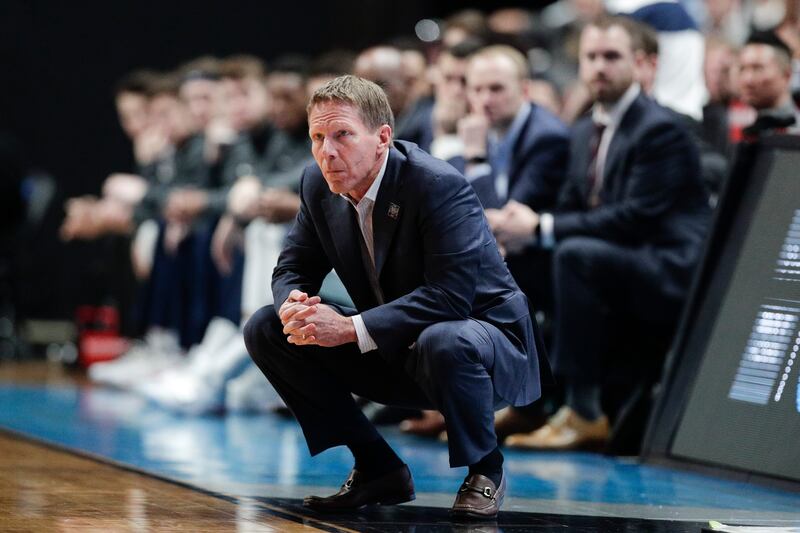LAS VEGAS — Gonzaga coach Mark Few didn’t hold back when asked about the controversial new legislation that California governor Gavin Newsom signed into law this week allowing college athletes in that state to receive compensation for the use of their name, image or likeness beginning Jan. 1, 2023.
That means athletes will be able to hire agents and sign endorsement deals, which, of course, is prohibited by the NCAA.
Similar bills have been introduced in other states.
Few isn’t happy about politicians getting involved in college sports.
“I think it was a big publicity stunt by the governor. It will affect .00001 percent of his constituents. He probably needs to spend his time elsewhere,” said Few, who has led the Zags to five consecutive NCAA Sweet 16 appearances. “We have some people in our sport that (have) been working on this and come with a much better, well-thought out plan that will address this issue as best we can. We’re the ones involved in the sport. The student-athletes and administrators and coaches should be the ones working on this. We really don’t need help from grandstanding politicians. We need them to help us expedite things as much as they need our help solving their homelessness problem and border problems and things like that.”
Most WCC coaches who were asked about the legislation, also known as the Fair Pay to Play Act, during league’s annual media day festivities Thursday say they are in favor of compensating athletes but they have a lot of questions about how it will be done.
“I’m not against athletes being able to make money off their likeness. It’s tricky. We don’t know what it’s going to look like,” said Saint Mary’s coach Randy Bennett. “Say (BYU forward) Yoeli Childs wanted to have a basketball camp in the summer. Because of his name, he could draw kids there and make money off that. I don’t see any problem with it. Kids should be able to do that. Realistically, this is their window of time, especially for sports like women’s basketball. In principle, it’s right. But how is it going to work? It can’t be that some states have it and some don’t.”
“The idea of young men being able to be compensated for their likeness seems like the right thing to do. Is there any other organization that restricts people from being compensated for their likeness and image? I don’t know of any,” said BYU coach Mark Pope. “It makes a lot of sense. My biggest concerns are the hodge-podge way it’s happening, which will be really destructive. Even if you make a blanket change, it’s still going to have a billion unintended consequences that we don’t see right now. We need to do this in a smart, timely manner so we don’t end up hurting the players because they don’t understand the rules.”
“It seems like that train has left the station. It’s very likely, if not inevitable, that players will be able to benefit from their name, image and likeness,” said Santa Clara coach Herb Sendek. “All the momentum is headed that direction. Right now, the key is in the implementation. There are important questions to be answered. I don’t know if there’s a whole lot of value in deciding if it’s good or not. It’s reality now. How can it be done in a way that minimizes unintended consequences and works for everybody as well as possible. Philosophically, I’m not against players being able to benefit as much as possible, but how will it be implemented?”
How do the athletes feel about this topic?
BYU senior TJ Haws likes the idea of athletes being able to capitalize on their fame and talent while in college.
“It’s a good thing. I don’t think people see how many hours are put into basketball. There’s so much behind the scenes that goes on,” he said. “Players deserve a chance to be benefitted from their image. This might be the only time for some people to have that opportunity. It’s a good thing, for sure.”
“I don’t see an issue with players using their likeness to make a little bit of money,” said Saint Mary’s guard Tanner Krebs. “I can’t imagine it will be large sums of money. I’m sure there will be rules and regulations behind it. I think the NCAA will figure it out.”


